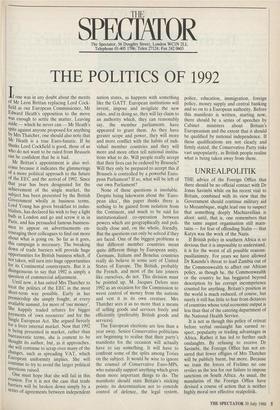THE POLITICS OF 1992
If one was in any doubt about the merits of Mr Leon Brittan replacing Lord Cock- field as our European Commissioner, Mr Edward Heath's opposition to the move was enough to settle the matter. Leaving aside — which he never can — Mr Heath's spite against anyone proposed for anything by Mrs Thatcher, one should also note that Mr Heath is a true Euro-fanatic. If he thinks Lord Cockfield is good, those of us who do not want to be ruled from Brussels can be confident that he is bad.
Mr Brittan's appointment is also wel- come because it indicates the glimmerings of a more political approach to the future of the EEC and the arrival of 1992. Since that year has been designated for the achievement of the single market, the subject has been presented by the British Government wholly in business terms. Lord Young has given breakfast to indus- trialists, has declared his wish to buy a light bulb in London and go and screw it in in Paris, and has persuaded famous business- men to appear on advertisements en- couraging their colleagues to find out more about what is going on. So far as it goes, this campaign is necessary. The breaking down of trade barriers will provide huge opportunities for British business which, if not taken, will turn into huge opportunities for its Continental counterparts. But it is disingenuous to say that 1992 is simply a question of commercial adjustment. Until now, it has suited Mrs Thatcher to treat the politics of the EEC in the most short-term way possible. Early in her Premiership she simply fought, at every available summit, for more of 'our money'. She happily traded rebates for bigger Payments of 'own resources' and for the Single European Act. She argued fiercely for a freer internal market. Now that 1992 is being presented in market, rather than bureaucratic terms, she is content to be thought its author, but, as it approaches, she will continue to scrap over many of the changes, such as spreading VAT, which European uniformity implies. She will continue to try to avoid the larger political questions raised.
One must hope that she will fail in this evasion. For it is not the case that trade barriers will be broken down simply by a series of agreements between independent nation states, as happens with something like the GATT. European institutions will invent, impose and invigilate the new rules, and in doing so, they will lay claim to an authority which, they can reasonably say, the member parliaments have appeared to grant them. As they have greater scope and power, they will more and more conflict with the habits of indi- vidual member countries and they will more and more often tell national institu- tions what to do. Will people really accept that their lives can be ordered by Brussels? Will they only be prepared to accept this if Brussels is controlled by a powerful Euro- pean Parliament? If so, what will be left of our own Parliament?
None of these questions is insoluble. Despite being lukewarm about the 'Euro- pean idea', this paper thinks there is nothing to be gained from isolation from the Continent, and much to be said for institutionalised co-operation between powers which are geographically and poli- tically close and, on the whole, friendly. But the questions can only be solved if they are faced. One of the biggest problems is that different member countries mean quite different things by European unity. Germans, Italians and Benelux countries really do believe in some sort of United States of Europe. The British, probably the French, and most of the late joiners like ourselves, do not. This division must be pointed up. M. Jacques Delors sees 1992 as an occasion for the Commission to wrest control of money from the nations and vest it in its own creature. Mrs Thatcher sees it as no more than a means of selling goods and services freely and efficiently (preferably British goods and services).
The European elections are less than a year away. Senior Conservative politicians are beginning to realise that their party's manifesto for the occasion will actually have to say something. It will have to confront some of the splits among Tories on the subject. It would be wise to ignore the counsel of Conservative Euro-MPs, who naturally support anything which gives them more important things to do. The manifesto should state Britain's sticking points: its determination not to concede control of defence, the legal system, police, education, immigration, foreign policy, money supply and central banking and so on to a European authority. Before this manifesto is written, starting now, there should be a series of speeches by Cabinet ministers about Britain's Europeanism and the extent that it should be qualified by national independence. If these qualifications are not clearly and firmly stated, the Conservative Party risks vast unpopularity, as British people realise what is being taken away from them.














































 Previous page
Previous page